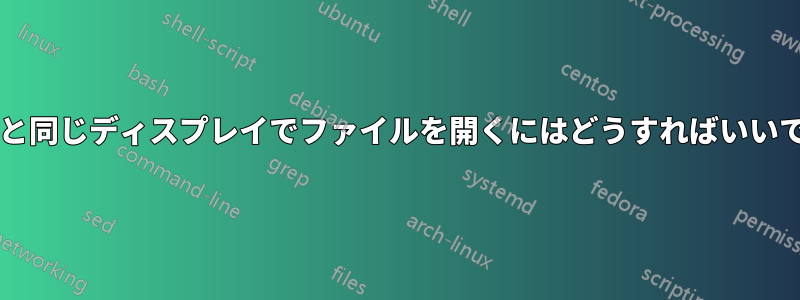
ラップトップに LCD を接続しました。Nautilus でファイルを開こうとすると、ターゲット アプリケーションが、2 番目のディスプレイ (Nautilus ウィンドウが開いているディスプレイ) ではなく、ラップトップのディスプレイで開きます。
デフォルトのディスプレイを変更したくありません。作業中のディスプレイでウィンドウを開きたいです。ファイル マネージャーがラップトップ ディスプレイにある場合は、アプリもラップトップ ディスプレイで開きます。ファイル マネージャーが外部ディスプレイにある場合は、そこでファイルを開くことを期待します。
の出力xrandr
Screen 0: minimum 320 x 200, current 3286 x 1080, maximum 32767 x 32767
eDP1 connected 1366x768+0+0 (normal left inverted right x axis y axis) 256mm x 144mm
1366x768 60.1*+
1360x768 59.8 60.0
1024x768 60.0
800x600 60.3 56.2
640x480 59.9
VGA1 disconnected (normal left inverted right x axis y axis)
HDMI1 connected primary 1920x1080+1366+0 (normal left inverted right x axis y axis) 527mm x 296mm
1920x1080 60.0* 50.0 59.9
1920x1080i 60.1 50.0 60.0
1680x1050 59.9
1280x1024 75.0 60.0
1440x900 59.9
1280x960 60.0
1280x800 59.9
1152x864 75.0
1280x720 60.0 50.0 59.9
1440x576i 50.1
1024x768 75.1 70.1 60.0
1440x480i 60.1 60.1
832x624 74.6
800x600 72.2 75.0 60.3 56.2
720x576 50.0
720x480 60.0 59.9
640x480 75.0 72.8 66.7 60.0 59.9
720x400 70.1
DP1 disconnected (normal left inverted right x axis y axis)
HDMI2 disconnected (normal left inverted right x axis y axis)
VIRTUAL1 disconnected (normal left inverted right x axis y axis)
答え1
あなたが説明する動作(現在の画面でウィンドウを開く)すべきデフォルトの動作です。私の 14.04 ではそのようになっています。
一部のグラフィック ドライバー/GPU の組み合わせでは、若干の非互換性があるため、場合によっては「異常」が発生することがあります。「クリーン」オプション (修正) が利用できない場合は、以下の回避策を使用できます。
バックグラウンド スクリプトが存在し、新しいウィンドウが表示されるかどうかを確認します。新しいウィンドウが存在する場合、スクリプトはウィンドウの位置を現在のマウスの位置と比較します。マウスと新しいウィンドウの両方が同じ画面上にない場合は、windowmove` コマンドを使用してウィンドウを移動しますxdotool。
バックグラウンド スクリプトは悪い考えでしょうか?
バックグラウンドスクリプトが必要ない場合は使用しないでください。
同時に、重要な機能を追加したり、時間を節約したりする場合は、使用しないのは愚かなことです。もしスクリプトはよく構成されているため、「燃料が少ない」です。
参考までに:私のノートパソコンとデスクトップの両方で、私は常に少なくとも5つのバックグラウンドスクリプト+テスト目的の追加スクリプト(どれでも知らせ。
燃料を節約するために何が行われますか:
- スクリプトには可変ループサイクルがあります
10秒ごとにスクリプトは2番目のスクリーンが接続されているかどうかをチェックします。接続されていない場合は、スクリプトはウィンドウのチェック手順全体をスキップし、10秒後に再チェックします。つまり、スクリプトはのみ2 つ目の画面が接続されている場合に動作します。2 つ目の画面が接続されると、10 秒以内にループは 2 秒の周期に変更されます。 - スクリプトが実行するすべての(次の)アクションは条件付きです
例えばマウスの位置はのみチェック済みもし新しいウィンドウなどがあります。
全体として、私のシステムでは気づかず、測定もできなかったどれでもスクリプトの結果として、追加の負荷が発生します。
スクリプト
#!/usr/bin/env python3
import subprocess
import time
def get(cmd):
try:
return subprocess.check_output(cmd).decode("utf-8").strip()
except subprocess.CalledProcessError:
pass
def screen_limit():
screendata = [s for s in get("xrandr").split() if s.count("+") == 2]
if len(screendata) == 2:
return int([s.split("x")[0] for s in screendata if "+0+0" in s][0])
wd1 = get(["wmctrl", "-lG"])
t = 0
while True:
time.sleep(2)
# once per 10 seconds, check for a second screen
if t == 0:
while True:
rightside = screen_limit()
# if no second screen, skip the procedure
if rightside == None:
time.sleep(10)
else:
break
wd2 = get(["wmctrl", "-lG"])
# check for buggy wmctrl
if all([wd2 != None, wd1 != None]):
wins = [w.split() for w in wd2.splitlines()]
# check for new windows
relevant = [w for w in wins if not w[0] in wd1]
if relevant:
# if new windows appeared, see if they match the mouse pos
mousepos = int(get([
"xdotool", "getmouselocation"
]).split()[0].split(":")[1])
for w in relevant:
check = [mousepos < rightside, int(w[2]) < rightside]
if check[0] != check[1]:
# if mouse and window are not on the same screen > move
if check[0] == False:
cmd = ["xdotool", "windowmove", w[0],
str(int(w[2]) + rightside), w[3]]
else:
cmd = ["xdotool", "windowmove", w[0],
str(int(w[2]) - rightside), w[3]]
subprocess.Popen(cmd)
wd1 = wd2
t = 0 if t == 10 else t
t += 1
使い方
スクリプトには
wmctrlと の両方が必要ですxdotool。ターミナルで実行します。sudo apt-get install xdotool wmctrl- スクリプトを空のファイルにコピーし、
move_windows.py テスト - 次のコマンドでスクリプトを実行します。
python3 /path/to/move_windows.pyすべてが期待どおりに動作する場合は、スタートアップ アプリケーションに追加します: Dash > スタートアップ アプリケーション > 追加。次のコマンドを追加します:
/bin/bash -c "sleep 15 && python3 /path/to/move_windows.py"


